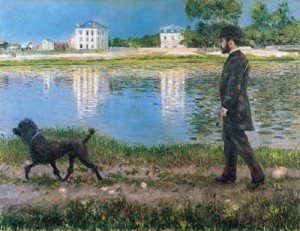
Richard Gallo and his dog at Petit Gennevilliers
near Paris. By impressionist painter Gustave
Caillebotte. Source: Wikimedia Commons
In the modern urbanized world it is often forgotten that throughout history humans have been very dependent on animals for their survival and livelihoods. Until recently most humans in the developed world share their cities with animals, in particular those that provided transport or energy for all kinds of labour. Most obvious of these are horses and donkeys. But none of these animals has such as long symbiotic history with humans as dogs. Today, most dogs in the developed world are kept as pets. However, urban dogs have also been economically as well as culturally important. The history of urban dogs is a story that has hardly been told. This was also noticed by Chris Pearson, Lecturer in Twentieth Century History at the University of Liverpool in the UK, and he is working on a research project entitled “Canine City: Dogs, Humans, and the Making of Modern Paris”. In this episode of the podcast Dr. Pearson talks about this project and the role of dogs in modern urban history.
Blog mentioned
Sniffing the past – Blog on canine history by Chris Pearson
Music credits
“Where You Are Now” by Zapac
Available from ccMixter
“Copy me in B minor” by My Free Mickey
Available from ccMixter
Recent Comments